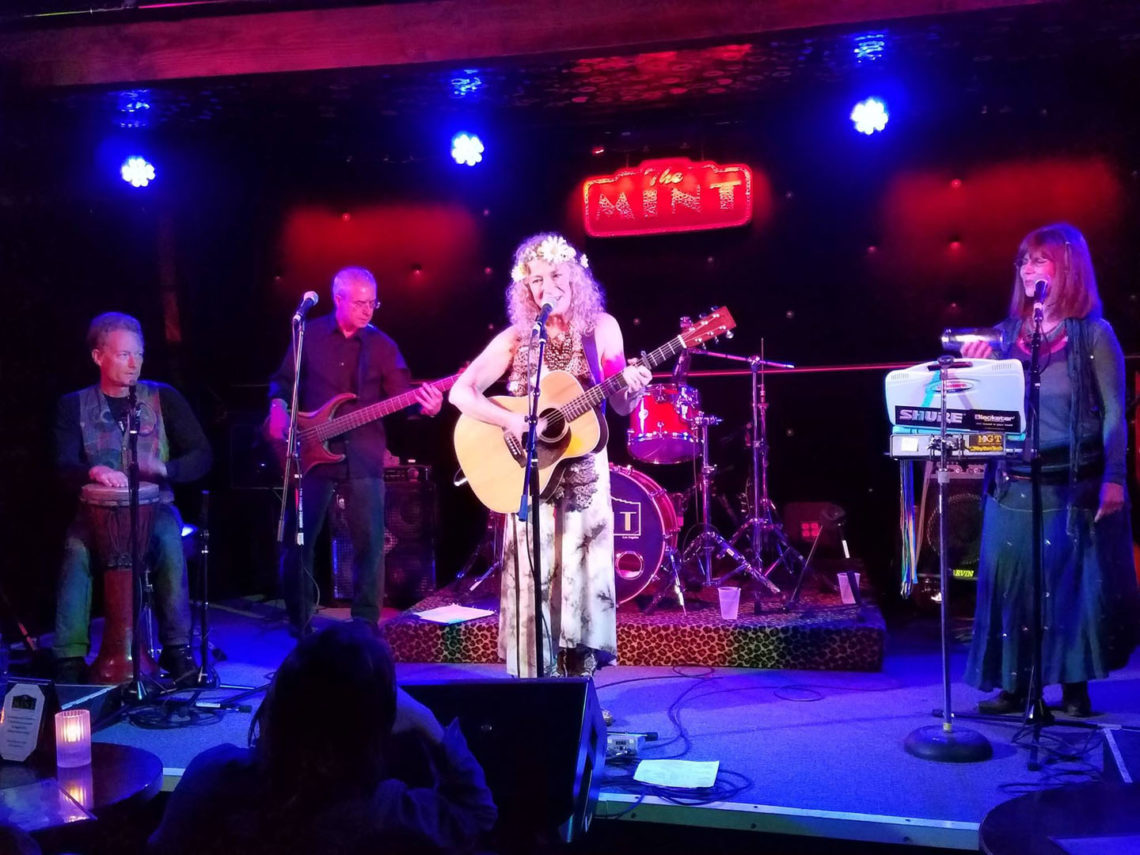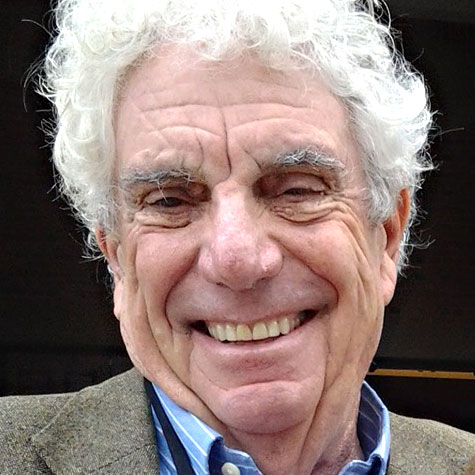 Karen Hart performs at The Mint in West Los Angeles. Photo via Karen Hart/Facebook.
Karen Hart performs at The Mint in West Los Angeles. Photo via Karen Hart/Facebook. Growing up in Norfolk, Va., in a Conservative Jewish home, singer-songwriter Karen Hart was intrigued by how the chants she heard in her synagogue resembled gospel music.
“I never felt connected to the God part,” she said. “What I loved most was listening to the cantor sing. To me, it sounded like the Black singers I was exposed to, the wailing, the sliding from one note to another.”
Hart and I were chatting on the front porch of a Santa Monica house after she had performed in the backyard for the annual music festival held there, “Jeffest.”
My friends Claudia Luther and Tom Trapnell had told me about Hart, who lives near them in the West Los Angeles neighborhood of Mar Vista with her husband, Bryan. I was intrigued by the first song on the CD Tom gave me, “Judah and His Maccabees: A Hanukkah Gospel Story.”
Growing up, I was unhappy about the shortage of winners in Jewish history as well as — admitting my youthful superficiality — on the sports and main news pages of the newspapers. I admired King David and overlooked the Bathsheba episode. I seized on the story of Judas Maccabee, the Jewish priest who led the Maccabean Revolt against the Seleucid Empire (167-160 B.C.E.) and restored Jewish prayer at the Temple in Jerusalem.
When Claudia and Tom told me about Hart, I said, “I love that story. I have to write about her for the Jewish Journal.”
At her performance on a hot Saturday afternoon, Hart, accompanied by her band, Jennifer Leitham and Randy Drake, demonstrated her lovely voice and a warm manner. It was as if she was inviting the receptive audience to join her at a party. She is reminiscent of her idol, Joni Mitchell, the Canadian singer-songwriter, and part of Hart’s repertoire is a “Salute to Joni Mitchell.”
Hart told me she studied classical music at East Carolina University and then took off with her dog in a Volkswagen camper to sing and write songs.
“I hit the road and played in any club that would have me,” she said. She’d buy the local paper and look up the clubs. “I’d go into the club, talk to the manager and ask if I could play there,” she said. She made her way to Los Angeles. “If I was going to make it as a songwriter, L.A. was the place to be,” she said.
Then she got a break. Her best friend in B’nai B’rith Girls back in Virginia had a brother who was a movie producer. He was producing a 1985 comedy called “Lust in the Dust,” starring Tab Hunter, Divine and Lainie Kazan, and Hart composed the songs for it, as well as continuing to play clubs. She even ran into Joni Mitchell at a clothing rack in Bullock’s and gave her one of her CDs after a brief and pleasant chat.
A dispute with a manager interrupted her singing career.
“I put down my guitar and didn’t touch it for five years. So I had to make a living. I had heard of word processing,” she said. She said she memorized word processing manuals and eventually developed a business teaching computer skills in what was then a new field.
Eventually, she returned to singing, joining choirs. And she returned to songwriting and thought of her youth.
“I thought the Chanukah music was horrible,” she said. “So I am going to write something for Chanukah but in the Negro spiritual style.”
The result is a rousing piece that sounds great, especially when sung by a choir.
Others have commented on the confluence of the Jewish and African-American experiences as reflected in each group’s music. In 2010, J. The Jewish News of Northern California wrote about the popularity of Cantor Stephen Saxon, who composed a number of gospel songs based on Friday night prayers.
Black gospel singer Josh Nelson discussed the relationship in an article in the Jewish Chronicle the same year.
Nelson said, “Gospel is closely connected to the African experience of slavery in America. It’s a bittersweet sound because without such hard experience we could never have the good music. That kind of hardship is so close to the Jewish experience. Jewish people have always been isolated within communities in Europe over centuries. The sounds are closely aligned, too — there is a deep similarity between the wailing of the cantors from the shtetls in Europe and the groaning of the African slaves.”
Like these artists, Hart is demonstrating the diversity of American life, performing “Judah and His Maccabees” around the country, showing how two cultures, so different in the popular mind, have much in common.
BILL BOYARSKY is a columnist for the Jewish Journal, Truthdig and L.A. Observed, and the author of “Inventing L.A.: The Chandlers and Their Times” (Angel City Press).























 More news and opinions than at a Shabbat dinner, right in your inbox.
More news and opinions than at a Shabbat dinner, right in your inbox.